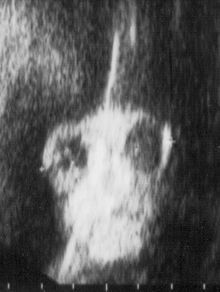Anencephaly
The National Institute of Neurological Disorders and Stroke (NINDS) describes the presentation of this condition as follows: "A baby born with anencephaly is usually blind, deaf, unaware of its surroundings and unable to feel pain.Although some individuals with anencephaly may be born with a main brain stem, the lack of a functioning cerebrum permanently rules out the possibility of ever gaining awareness of their surroundings.Studies have shown that the addition of folic acid to the diet of women of child-bearing age may significantly reduce, although not eliminate, the incidence of neural tube defects.[13] Genetic counseling is usually offered to women at a higher risk of having a child with a neural tube defect to discuss available testing.As a result of new genetic research, some of these are, in fact, highly related in their root cause despite the widely varying set of medical symptoms that are clinically visible in the disorders.The underlying cause may be a dysfunctional molecular mechanism in the primary cilia structures of the cell, organelles present in many cellular types throughout the human body.The cilia defects adversely affect "numerous critical developmental signaling pathways" essential to cellular development and, thus, offer a plausible hypothesis for the often multi-symptom nature of a large set of syndromes and diseases.Craniorachischisis is characterized by anencephaly accompanied by bony defects in the spine and the exposure of neural tissue as the vault of the skull fails to form.[19][20] Craniorachischisis occurs in about 1 of every 1000 live births, but various physical and chemical tests can detect neural tube closure during early pregnancy.A cluster of cases made national headlines[24] and prompted a public health investigation and the Texas Neural Tube Defect Project.It was found, that neural tube defects in general, including spina bifida, and encephalocele had been occurring in Mexican-American women undetected for years in the area.[citation needed] Neocortical death, similar to a persistent vegetative state (PVS), involves loss of cognitive functioning of the brain.A related bill, the Uniform Anatomical Gift Act (UAGA), grants individuals and, after death, their family members the right to decide whether or not to donate organs.

SpecialtyMedical geneticspediatricsSymptomsRisk factorsPrognosisembryonic developmentcephalic disorderneural tube defectneural tubetelencephalonneocortexcognitionbrain stemFolic acidphysicianheredityBruno Reversadetranscription factorGenetic counselingacraniaanticonvulsantsgenetic disordersgenetic syndromesgenetic diseasesroot causedisordersemergingciliopathiesorganellesmulti-symptomprimary ciliary dyskinesiaBardet–Biedl syndromepolycystic kidneyliver diseasenephronophthisisAlström syndromeMeckel–Gruber syndromeretinal degenerationultrasoundalpha-fetoproteinAFP screeningspina bifidacranialvascular tissueconnective tissuechoroid plexusesRachischisisspinal columnneural tissuestillborncardiorespiratory arrestUnited StatesNigeriaencephalocelefolic acid deficiencyorgan donationorgan transplantsslippery slopeUnited KingdomCardiffkidneysbrain deathneocorticalpersistent vegetative statePET scansUniform Determination of Death ActUniform Anatomical Gift Actcartilage homeoprotein (CART1)chondrocytesAcalvariaMicrocephalyWayback MachineDiseasesDBMedlinePluseMedicineCongenitalnervous systemIniencephalyChiari malformationCongenital hydrocephalusDandy–Walker syndromeHoloprosencephalyLissencephalyMicrolissencephalyPachygyriaHydranencephalyAgenesis of the corpus callosumSepto-optic dysplasiaMegalencephalyHemimegalencephalyCNS cystPorencephalySchizencephalyPolymicrogyriaBilateral frontoparietal polymicrogyriaSpinal cordCurrarino syndromeDiastomatomyeliaSyringomyelia